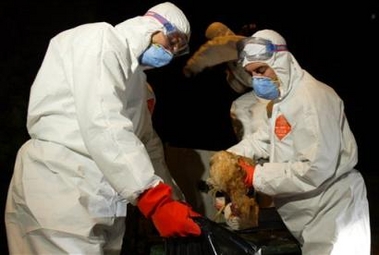|
Team searches Turkish village for poultry
(AP)
Updated: 2005-10-14 08:53
A team in white, full-body protective suits scoured a village in western Turkey Thursday for any poultry farmers might be hiding or that could have escaped destruction after the European Union confirmed a virulent strain of bird flu had been detected in the region.
The Turkish government said it has contained the outbreak of the H5N1 virus, which scientists worry might mutate into a human virus and spark a pandemic.
Bird flu was detected after 1,800 turkeys died on a farm in Kiziksa, 80 miles southwest of Istanbul.
Authorities have destroyed some 8,600 turkeys and chickens in the area and placed the village under quarantine, but hundreds of poultry apparently escaped the destruction.
"Normally it would be over, but a few people are hiding their chickens," said one veterinary official, speaking on condition of anonymity because Turkish officials can only talk to reporters with prior authorization.
Farmer Aile Onat came to the truck with two white bags carrying two or three ducks each. The veterinary officials wore protective suits and face masks, but Onat wore only his street clothing. He was smoking a cigarette with one hand and pulled the animals with his other bare hand from the bags.

A team from the Turkish Agriculture Ministry destroys some of the last remaining birds in the village of Kiziksa, near the western Turkish town of Manyas, Thursday Oct. 13, 2005.[AP] |
He said he found the killing of the animals pointless.
"There is nothing to be afraid of," Onat said. "They are perfectly healthy."
The animals squawked loudly as they were forced into the small box in the back of the truck. A few seconds later the hissing of gas could be heard followed by silence. Onat appeared angry and quickly left.
Kiziksa Mayor Ekrem Gokturk said the government would pay farmers $3.70 for each of their chickens and $22 for a goose.
Many in the village were like Onat and seemed to brush aside the dangers.
"Normal life is going on, people are not afraid," Gokturk said.
But the veterinary official warned that "the people who know what is going on are afraid."
For the past week, Kiziksa has been under quarantine following the discovery of the dead turkeys. A Turkish laboratory tested samples from the birds and confirmed they had an H5 strain of bird flu. The samples were then sent to a laboratory in London to test for the feared H5N1 strain.
On Thursday, EU Health Commissioner Markos Kyprianou announced in Brussels that "we have received now confirmation that the virus found in Turkey is an avian flu H5N1 virus."
The H5N1 bird flu strain does not easily infect humans, but 117 people, mostly those who have had repeated contact with infected poultry, have caught it over the last two years and 60 have died. Scientists are tracking the spread of the virus in birds because it could mutate into a dangerous human pandemic strain.
Agriculture Minister Mehdi Eker said authorities were on alert for cases elsewhere in Turkey, which lies on the path of several migratory bird species.
Turkish authorities believe the turkeys contracted the disease from migratory birds that pass through the Manyas Bird Sanctuary outside of the village on their way to Africa from the Ural mountains in Russia.
Turkish paramilitary police set up three checkpoints outside the village, the first eight miles away.
All cars entering or exiting the village had to drive through a disinfectant pool several inches deep.
Turkey has asked the Swiss pharmaceutical company Roche Holding AG for 1 million boxes of a standard flu medicine as a precaution, said a Health Ministry official who spoke on condition of anonymity because she was not authorized to speak to the media. Each box contains 10 capsules.
Kyprianou said the European Commission was proposing to set aside $1.2 billion to help make and distribute anti-virals and vaccines "in case of a pandemic."
He advised EU countries to administer the standard flu vaccine to vulnerable populations: people over age 65, young children, those with weakened immune systems or chronic respiratory conditions and those living near the outbreak sites. There is no vaccine to protect against bird flu, but experts believe the standard flu vaccine could help.
|